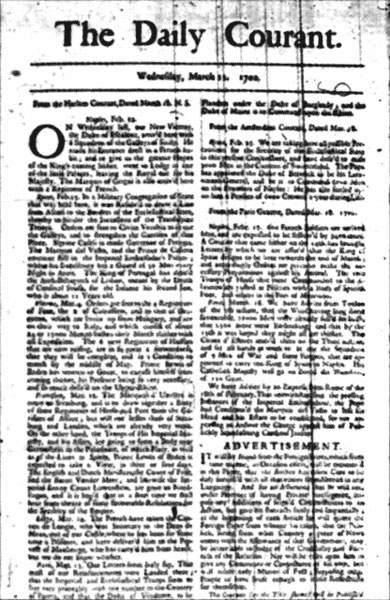As Newspapers Lay Dying, A Birthday

Wikimedia Commons
It's 1702. London is a bustling cacophony of street sellers and businessmen navigating the cobble-stoned streets. This sewage-lined, rat-infested city is the center of the world, a hub in the expansive British Empire. The rain is falling in droves, and you take shelter inside a coffeehouse on Fleet Street, eager to enjoy a steaming cup of the controversial poison leaking from the Ottoman Empire.
Inside, a crowd of men (no women are allowed in the coffeehouses, of course. They prefer to stay at home in the parlor) are arguing amid a cloud of cigar smoke. You take a seat next to an acquaintance and observe the focal point of the discussion: a broad sheet, crammed with small black lettering, it's title displayed in a larger font at the top: The Daily Courant.
This is Britain's first daily newspaper. This is the birth of a medium that, in the centuries to come, will remain an essential part of public discourse. It begins here, on this very street, published above the White Hart pub, a stone's throw from the coffeehouse in which you sit.
The Daily Courant is a single sheet claiming to "give news daily and impartially." Its content is focused on foreign affairs, appropriately, since the obsession with the world beyond England's tiny shores is exponentially growing. Explorer William Dampier has recently returned from adventures in the Southern hemisphere, and his journal, A New Voyage Around the World (1697), is still grasping the British imagination. In 24 years, the trend with foreign adventuring and travel journals will become so obvious that a heretofore unknown writer, Jonathan Swift, will parody the obsession with a book titled Gulliver's Travels. You will enjoy this novel, and read the first two sections to your children. They, in turn, will read it to theirs, and so on, for centuries to come.
It seems like just another rainy Thursday. What this day means, for history or for the British public, you do not yet know. But there is excitement in the air. The gentlemen of the coffeehouse are sipping their devil's juice and loudly discussing the War of the Spanish Recession and their travel-loving King, William III, who spends more time on the continent than at home (not knowing, of course, that he will be dead before the month is out.)
But there are a few men, sitting here on the wooden pews, who have an inkling that this single sheet of inky information is more than cellulose pulp. One of those men is Joseph Addison, another, John Steele. In less than a decade they will begin their own daily newspaper, The Spectator, and play their part in an intellectual revolution. Addison, soon to become a contributor to The Daily Courant, knows that a new way of thinking is emerging. The public consciousness is about to be fed with ideas "of which it was not before possessed." Discourse will be set aflame by this new medium, and the fires will sweep across the country on a scale wider than ever before seen, ushering in a new era -- the Age of Enlightenment.
In 300 years, when your body is long decayed, your ancestors too will be at the coffeehouse, imbibing non-fat Lattes, drinks of which you have never heard, and staring into pieces of glowing furniture. Public discourse will have moved to the virtual coffeehouse, an invisible world. No one will smoke cigars indoors. Strange verbs will have entered the English language for virtual actions, words like "Google," "tweet" and "digg." This is the vocabulary that will lead the second Age of Enlightenment, the new Internet Era. The newspapers that you witness being born here today, of which there are now hundreds in England alone, are being re-invented after three centuries in light of advancing technology. Some say their disappearance is imminent now, that they are irrelevant. But nothing would have been the same without them.
And here you are, sipping coffee on Fleet Street in 1702 on the birth day of The Daily Courant, watching it all literally unfold.



